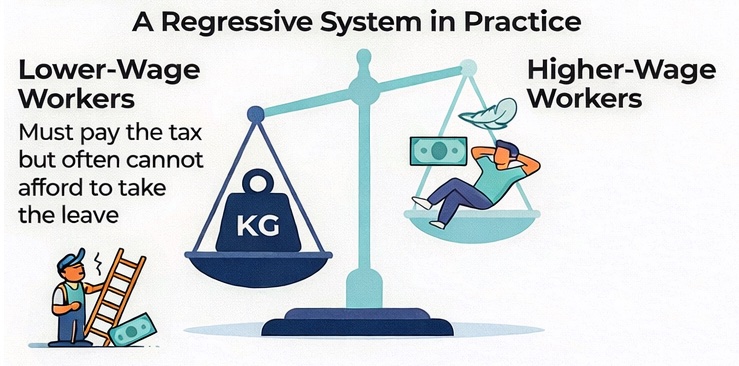Last Sunday The Seattle Times published an editorial I submitted detailing the hypocritical exemptions unions seek to the restrictive labor mandates they actively support. In many cities, unionized employers are exempt from paying a higher minimum wage or providing paid sick leave.
I’ve blogged about the union exemption issue multiple times, so I am pleased the Times chose to give the issue a broader audience. An issue as important as this deserves to be debated and discussed honestly, and it seems it is finally in the spotlight. Just last week the L.A. Times wrote about and editorialized against union exemptions, and the World Socialist Website published a scathing editorial blasting unions for their hypocrisy.
The reader response to my editorial from those who support unions has been interesting. You can tell a lot from the responses; as one reader put it, “well this article sure brought out some emotions.” Many of the comments posted were knee-jerk reactions, many quite vitriolic, which offer no explanation or justification for the unions’ hypocrisy, instead simply rant about the “hit-piece” and how WPC is “anti-union.” Here are a couple of my favorites:
“The Washington Policy Center is NOT a nonprofit research organization. It is the policy arm of the larger American's for Prosperity, a lobbying organization funded by the Koch Brothers.”
“The Washington Policy Center will not stop spewing this anti union vitriol until we are all working for minimum wage with no benefits and no worker rights. What complete hogwash! Most union workers are already making over minimum wage, so her claims carry no weight. Just more right wing union bashing to push their agenda…”
One reader declared WPC “is nothing more than a smug propaganda mill for corporate interests,” but then begrudgingly admitted that, “unions should not be exempt from practicing what they preach."
Then there were the readers who flat-out refused to believe what I wrote was true. The truth about unions’ self-dealing is so outrageous that these union supporters simply could not believe it and so dismissed the issue entirely:
“What a bald faced lie Erin Shannon, the Washington Policy Center and the Seattle Times editorial staff are pushing. There is no exemption for unionized employees in any of those bills nor is there a union escape clause in the SeaTac ordinance.”
“This is a hysterical, fact-free hatchet job.”
“I've never read a less neutral piece from an alleged research center. What a crock of crap.”
“What a subjective, poorly researched piece of tripe”
“It is an opinion piece that frames a subjective perspective around carefully selected factual circumstances.”
“What is this person babbling about?... her idiotic ramblings to do not apply to any union in the Seattle area I can think of.”
“I find it hard to believe that after being a member of organized labor for 40 years, that there is truth in the above story…There may be bits of truth in what she says, but when you take things out of context, you can slant a story in whatever direction you chose.”
Then, of course, there are the personal attacks:
“Why does that lady have a worried, 'help I'm being held captive,' look in her eyes?’”
“Your articles would be easier to read if it [sic] didn't include a picture of your face or your terrible hair. Please don't subject your readers such atrocities.”
Another comment dismissed me as “an angry right wing think tanker.”
I guess when you have no real defense or valid argument, ignoring the issue in favor of attack or denial are your only options.
To be fair, a few of the reader comments, and a letter-to-the-editor that was published today, actually addressed the issue and tried to justify the union exemption and explain why union employers should not be held to the same labor laws as non-union employers. The gist of their defense of unions is that the exemptions allow unions much-needed “flexibility” in negotiating wages and benefits for their workers.
“…the goal is for unions to negotiate a higher total compensation package (including wages and benefits), then the $15 minimum wage would otherwise provide.”
“In some cases union members may make less than $15 per hour, but get great benefits. Such as a pension and great vacation packages sick pay and much better health ins. That is why sometimes a union may want an exemption, because sometimes it means they will be asked to cut back on the benefits.”
“…the reality seems to be a simple and fairly obvious provision for employees to waive the $15 minimum through a bona fide collective-bargaining agreement…This allows some flexibility for cases where the employer’s workforce agrees to it…”
Of course, this defense of the union exemption provides the best argument against such union supported labor mandates. Employers of all sizes and in all industries have warned that a high minimum wage will force them to cut employee benefits, among other cost saving measures. It’s already happening in cities that have recently passed new minimum wage laws, including in Seattle. Clearly unions believe a higher minimum wage will reduce the nonwage benefits of the union’s workers, leaving those workers worse off.
Ironically, in using the “flexibility” argument to support the union exemption, supporters of a higher minimum wage can no longer deny there are trade-offs that come with forcing employers to pay an artificially high wage. They can no longer claim businesses will simply absorb the entire wage increase. They can longer declare all workers will be better off with the higher wage. They can no longer claim it is all benefits and no costs.
The union exemption, and their primary justification for the exemption, is an admission that increasing the minimum wage will come with costs. They just think it is a price non-union employers and union workers should be willing to pay.




